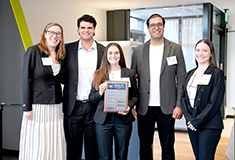H
undreds of industry leaders, alumni, and students gathered at Roger Williams University for the third annual Cummings Institute for Real Estate Symposium. The event brought together experts in construction, planning, real estate, law, and sustainability to explore the evolving nature of real estate development.
Issa Ramaji, executive director of the Cummings Institute for Real Estate, emphasized the symposium's focus on interdisciplinary collaboration and career pathways. "The Real Estate Symposium brings together industry leaders, alumni, and students to exchange ideas and highlight the dynamic nature of real estate today," he said.
Two panel discussions delved into navigating complex development regulations while balancing compliance with societal priorities like housing affordability and sustainability. Panelists emphasized the importance of genuine collaboration between government, community, and private sector stakeholders for successful projects.
Darcy Wilson, an infrastructure private equity investor, noted that "a true win-win-win happens when all three sectors are aligned." Pamella Seay, president of Seay Law International, highlighted the government's gatekeeping power, while Andrew Vasey emphasized the risk of failure in complex development deals. Despite these challenges, panelists advocated for more transparent and honest partnerships that prioritize community outcomes.
Margaret Everett, provost and senior vice president for academic affairs at RWU, praised the university's collaborative approach to real estate education. "Our vision is to create programming that prepares students for the future of real estate," she said.
Keynote speaker Kairos Shen, chief of planning for the City of Boston, offered insights on how urban transformation unfolds through negotiation, compromise, and cultural change. The daylong program also featured 11 student research presentations from the Cummings School of Architecture, showcasing creative solutions to regional housing issues.
First place was awarded to Grand Harbor Village, a proposal by Master of Architecture students Joseph DePoalo, Meghan Uluski, and Rose Walsh, which reimagines Newport's vacant casino site as a vibrant mixed-use development. Second place went to Common Junction, a project that addresses environmental concerns and community needs in North Kingstown, R.I.
The symposium highlighted the university's commitment to interdisciplinary education and its role as a national leader in real estate education. Graduates of RWU's programs are making a real impact across the industry through sustainable and equitable design, public policy, and fair housing advocacy.













